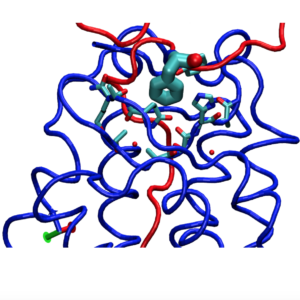A continuation of my last post, in which I describe my experience starting to work as a research assistant at a Chemical and Biological Engineering lab here at Princeton. My work began in 10th grade and ended early this year.
Several months in, I felt like I was finally getting my footing. I had expanded my knowledge enough that I could understand, and make meaningful contributions to, the research project. I was working on computationally modeling the 3D structure of one of the protein receptors that HIV-1 uses to infect human cells. This receptor can bind either to HIV-1 or to other proteins (ligands), and when these ligands are bound to the receptor, they block the entry of HIV-1. By modeling these structures, we hoped to design a synthetic protein that could block HIV-1 infection by binding to the receptor.

A few days after I returned home for the rest of the summer, I opened up an email from my post-doc supervisor and felt my heart skip a beat.
“Please write the introduction for our paper on modeling the structures of HIV-blocking proteins over the next two weeks.”
For the umpteenth time, I felt uncertainty flood in. There was absolutely no way I could produce the introduction to a publishable scientific paper. But when I called him back to ask for a more manageable task, he brushed off my concerns with a brazen confidence that I did not share and hung up.
I was on my own, facing down a project I couldn’t begin to wrap my mind around. After the requisite period of wallowing in self-pity, I decided that the only way to complete the task was to break it down into progressively smaller pieces until I could solve them one at a time.
I began by looking at scientific papers and plotting the contents of each paragraph. Then came hours of combing through dense, incomprehensible papers for a few words here and there. I drew comfort from the tedious process of citing my sources—the footnotes reassured me that my attempt might eventually resemble a scientific paper. And then one day I realized that I’d written the entire introduction.
From that day, my confidence grew. By treating me like a capable adult, my mentor had forced me to become one. As a result I developed critical problem-solving skills that have served me well since then. I learned to break seemingly overwhelming problems down into manageable pieces and to focus on solving each one of those without allowing myself to get lost in the magnitude of the whole task. Now, whenever I’m faced with a problem set or assignment that seems impossible, I pull from my experience at the lab and pick a small chunk to tackle first, working through the problem bit by bit.
The confidence and problem-solving skills I developed have allowed me to tackle problems successfully here at Princeton, and have also afforded me a unique experience: early this year, we published a paper in Proteins about the second project I worked on. I am listed as a co-author on the paper, and was even given the final read-through to make sure that everything was correct—a privilege I would never have imagined would be given to the youngest, least experienced member of the team. This job was entrusted to me after the other researchers saw how I had overcome the challenge of writing the introduction to the other paper to produce something of quality, and had faith that I could replicate my success. Though I once again felt unequal to the task initially, I was able to apply my strategy for tackling large projects, as well as the confidence I had gained, to successfully complete my assignment.
These skills are broadly applicable–any task, whether it be studying for a midterm or completing a problem set, can be made manageable by breaking it down into smaller pieces that are easier to complete. Using this strategy will help you complete your task successfully while keeping you from becoming overwhelmed by its magnitude.
— Alexandra Koskosidis, Engineering Correspondent

